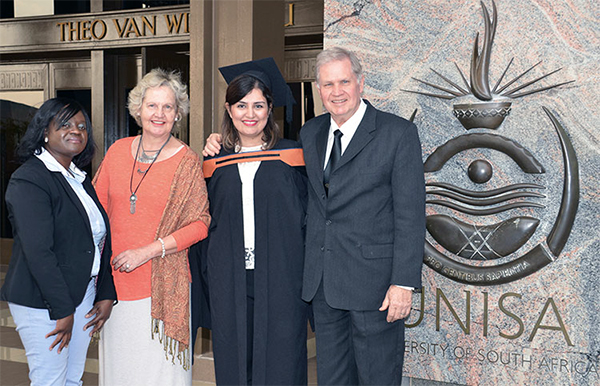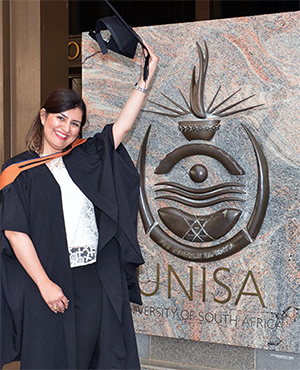News & Events
RPL made this Iranian’s academic dream a reality
Despite being denied access to higher education in her country, Iranian *Fatima Akbari (name has been changed) boarded a flight to South Africa after her academic dream became a reality. Akbari completed her BA Honours Degree, with distinction, in Church History, through Unisa’s Recognition of Prior Learning (RPL) programme. It was a proud moment indeed when she walked on stage last week to officially graduate at Unisa’s ZK Matthews Great Hall.

*Fatima Akbari is pictured with some of the people she calls her key enablers: Eugene Nkwashu (RPL coordinator at Unisa), Dr Marici Snyman (RPL Specialist in Department of Tuition Support at Unisa), (Fatima Akbari), and Brett Hone (from the South African group committed to providing access to higher academic education standards through international cooperation).
The RPL office became involved in a project with a group of Farsi speaking candidates from Iran who had to apply for access into post-graduate qualifications through the RPL process.
Akbari is the first student from the small pilot group who graduated. For various ideological reasons, Bahá‘ís, and some other Iranian youth, are denied access to higher education in their country. Akbari was one of the lucky few who was supported by a South African group committed to providing access to higher academic education standards through international cooperation. It was from this that a collaboration was formed with Unisa’s RPL office.

*Fatima Akbari completed her BA Honours Degree, with distinction, in Church History, through Unisa’s Recognition of Prior Learning (RPL) programme. Read the full article to find out why this was a true celebration for the Iranian.
Being faced with these challenges didn’t stop Akbari from passing her Honours degree with distinction. She said her journey and experience with Unisa and the RPL office has been nothing short of amazing. “I started communicating with my mentors to assist me, and some other students in the same situation. Finally, through their unrelenting efforts, and with the help of so many people like Ms Eugene Nkhwashu and Prof Erna Oliver, this has been possible,” she said.
Key enablers of my success
Akbari shared that RPL office was always ready to guide them, even when she was bombarding her mentors with many emails at a time. “They always responded so patiently, so I want to thank all those who assisted me during these years, including my mentors, both the RPL and the academic staff. They have been the key enablers of my success,” said Akbari with a grateful smile.
Now that she’s experienced this high of academic success, Akbari is excited to continue. Going forward she is really keen on doing research. “I want to study more and more, and focus on historical topics, considering them in different angles and finding answers to them.”
The academic benefits of RPL for Akbari has been huge. “It helped me to become familiar with the Unisa system before starting my course. In fact, studying the English course assisted me to improve my English skills (especially writing) which was really vital for my future essays,” she explained.
Dr Marici Snyman, RPL Specialist from the Directorate of Instructional Support and Services (DISS), at Unisa, explained that these students experience different challenges, such as their level of academic English. Therefore, prospective students are advised to register for English for academic purposes, concurrently with their RPL application. To further ensure the academic standard of the RPL process, students must prove competence at an advanced level, based on the level descriptors published by South African Qualifications Authority (SAQA).
RPL bridges the gap between diverse contexts of learning
The value of the RPL process is that it serves to bridge the gap between diverse contexts of learning. Since RPL follows a student-centred approach, each candidate is handled as an individual. “The strength of the RPL process is to consider the unique learner profile and prior learning of RPL students in both the assessment process and the student support that aim to contribute to success after access,” explained Snyman.
The fact that the Eugene Nkwashu, RPL coordinator at Unisa, was also willing to assist with administrative support throughout Akbari’s studies is evident of RPL staff are commitment to the success of students. “It was a privilege to have worked with this group of students who were eager to further their studies with Unisa,” said Nkwashu.
*By Kirosha Naicker
Publish date: 2017/05/24
